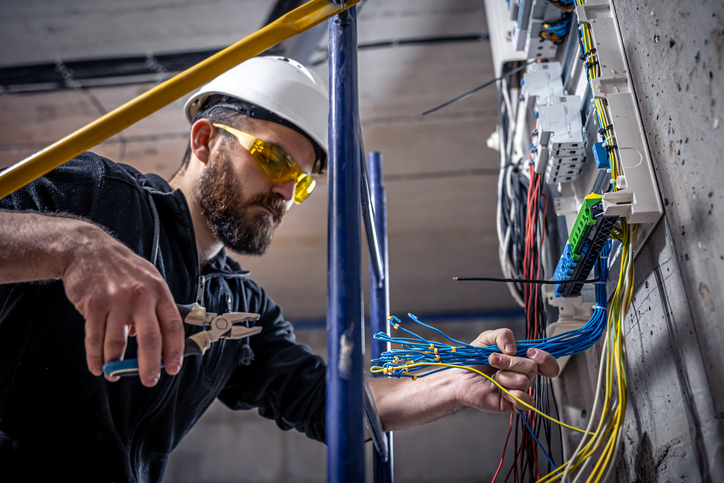
DIY or Professional? When to Call an Electrician
When you dealing with a problem in your home, the debate between taking the DIY route or calling in a professional is ever-present. This is particularly true when it comes to electrical work, where the stakes include not just cost and convenience, but safety and legality as well.
While its always tempting to sort the problem yourself to save on costs this may not always be the safest option. In this comprehensive guide, we’ll discuss the different scenarios when it’s advisable to handle electrical tasks yourself and when it’s time to dial up a licensed electrician.
Understanding the Basics of Home Electrics
First and foremost, it’s crucial to have a basic understanding of your home’s electrical system. Knowing what a circuit breaker does, how a fuse works and the purpose of a GFCI (Ground Fault Circuit Interrupter) outlet can help you make informed decisions.
While gaining this knowledge, one quickly realises that electrical work is not just about making sure the lights turn on; it’s about ensuring safety from electrical fires, shocks, and other hazards.
DIY Electrical Work: What’s Safe?
Replacing Light Fixtures
Swapping out an old light fixture for a new one is typically straightforward and within the realm of a competent DIYer. The key here is ensuring the power is turned off at the breaker and double-checking with a non-contact voltage tester before you start.
Changing Switch Plates or Outlet Covers
Updating or replacing switch plates and outlet covers is a simple task that requires minimal electrical knowledge. Again, ensure the power is off to avoid any shocks.
Installing Smart Home Devices
Many smart home devices are designed for the DIY market. This includes smart thermostats, doorbells, and light bulbs. These usually come with detailed instructions and require basic understanding and caution.
When to Call a Professional Electrician
Adding New Outlets, Switches, or Lighting
Installing new electrical fixtures often requires running new wiring, drilling through walls, and understanding complex wiring diagrams. This type of work can affect your home’s overall electrical load and safety. A licensed electrician can ensure that the installation meets local codes and standards.
Upgrading Your Electrical Panel
An electrical panel, or breaker box, is the heart of your home’s electrical system. Upgrading it to accommodate more circuits or replacing it due to age or malfunction is a job for a professional. This work involves high voltage and requires knowledge of local building codes and permits.
Wiring for Major Appliances
Installing or updating the wiring for major appliances, such as ovens, dryers, and HVAC systems, involves high-voltage circuits. These tasks require an understanding of electrical loads, circuit requirements, and safety standards, making them best suited for professionals.
Addressing Frequent Electrical Problems
If you’re experiencing frequent breaker trips, flickering lights, or outlets that don’t work, these could be symptoms of underlying electrical issues that require expert diagnosis and repair.
Outdoor Electrical Work
Outdoor electrical installations, such as landscape lighting, pool wiring, or outdoor outlets, require not only electrical knowledge but also an understanding of how to protect installations from the elements. This type of work often requires permits and inspections as well.
The Risks of DIY Electrical Work
Safety
The primary concern with DIY electrical work is safety. Electric shock, fires, and other electrical hazards are real risks when working with electricity without proper knowledge or tools.
Legal and Insurance Implications
Unauthorised or improper electrical work can void your home insurance, leave you liable for fines, or make it difficult to sell your home in the future. Professional electricians are licensed and insured, mitigating these risks.
Cost of Mistakes
While DIY might seem cost-effective, mistakes can be expensive to fix and can sometimes create more extensive issues than the original problem. Hiring a professional upfront can save money in the long run.
Finding the Right Electrician
When it’s time to call in a professional, choosing the right electrician is crucial. Look for licensed, insured electricians with good reviews and ask for estimates from multiple professionals to ensure you’re getting a fair price. Don’t shy away from asking about their experience with your specific type of project.
Conclusion
Navigating the decision between DIY and professional electrical work requires a careful assessment of the task at hand, your own skills and knowledge, and the potential risks involved. While there are certainly small projects and repairs that are suitable for DIY enthusiasts, the complexity and dangers of electrical work often mean that calling in a professional is the safest and most reliable choice. Ultimately, respecting electricity and prioritising safety can ensure that your home improvement projects light up your life in the best way possible.